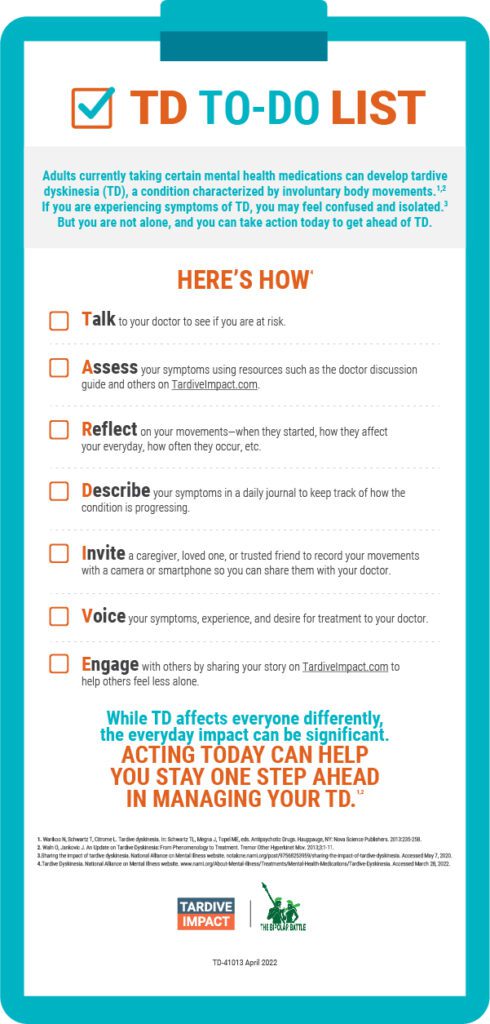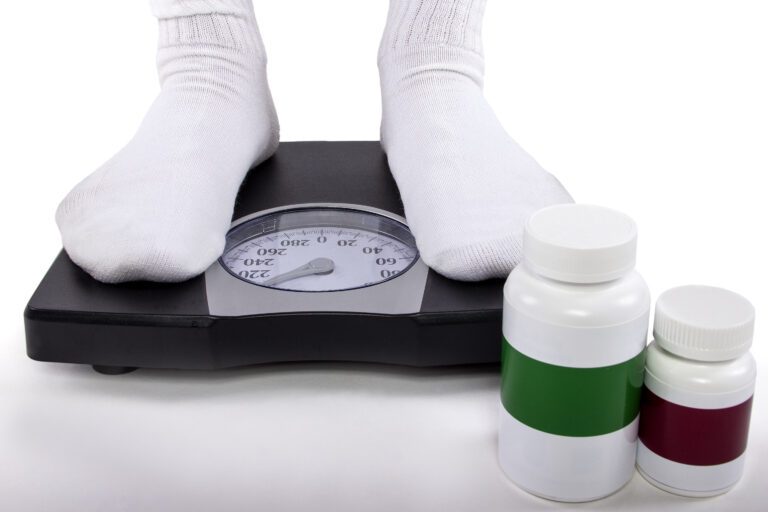What Is Tardive Dyskinesia?
This content is created in partnership with Teva Pharmaceuticals and is an important cause for me.
It is important to treat your mental health conditions as a whole, including any uncontrollable movements that may arise due to medications. Thankfully, there are now treatments that allow you to manage your movements without having to alter your existing mental health treatment regimen.1 However, in my experience, this topic is often overlooked and not discussed thoroughly with patients.2
From my perspective, patients generally understand that there are possible side effects with antipsychotic medications, but sometimes they do not know what to look for.1,2
Identifying The Symptoms
Tardive dyskinesia (TD) is a possible side effect of antipsychotic medication.1
One in four people who are taking medications for conditions such as schizophrenia, bipolar disorder, and major depression may develop uncontrollable movements of TD.3
TD may appear as mild-to-severe twitching, shaking, or jerking of the hands, feet, face, or torso. Involuntary blinking, tongue movements, and other unintentional, uncontrollable movements can also be signs of TD.1
Whether symptoms are mild, moderate, or severe, the impact of TD can be significant, causing physical manifestations that may lead to both functional and emotional challenges.1,2
Those undiagnosed, or who may be at risk of developing TD, can still be vigilant in looking for possible symptoms.3
Recognizing The Need To Talk With Your Healthcare Provider
From speaking with patients in the mental health community, I’ve found that like many other side effects of psychotropic medications, those living with TD sometimes would rather cope with their uncontrollable movements than alter their existing treatment regimen and risk possible relapse. But today, there are treatment options that allow me to continue my existing mental health treatment plan while still treating my TD.1
I know from my personal experience that it can be difficult to make that decision of finding the right treatment that works for you. What has helped me along my treatment journey has been close contact with my physician. However, from what I’ve observed, the constraints of the COVID-19 pandemic have resulted in patients receiving less in-person time with their doctors to check in and explain potential side effects of medications.
Additionally, since the option of telehealth visits are here to stay, it has limited the in-person connection patients like myself can make with their doctors. This, coupled with shorter visits, has signaled a greater need for self-advocacy during a doctor’s appointment.
Tracking Possible Side Effects
Self-advocacy is about taking an active role in your own treatment. I wanted to share this great TD To-Do list with helpful advice on how you can be more active in tracking and identifying TD symptoms. Some of these steps include: a doctor discussion guide to help prepare for those office visits. These resources and other helpful information about TD can be found on Tardiveimpact.com. There is also an online community you can join and share your own TD journey.

The content from TardiveImpact.com provides these tools so you can share with your healthcare provider and initiate conversations with them about symptom management. From there, you can work with your doctor to understand the treatment options that may be right for you. This is why I believe it is so important for you to keep track of how you are doing between appointments with your provider.
Whether you are undiagnosed, may be experiencing symptoms, or have a confirmed TD diagnosis from a physician, there are actionable steps you can take to help be aware of symptoms and, in the end, possibly successfully manage your condition.
To learn more, visit TardiveImpact.com.
1 Tardive Dyskinesia. National Alliance on Mental Illness website. https://www.nami.org/About-Mental-Illness/Treatments/Mental-Health-Medications/Tardive-Dyskinesia. Accessed March 28, 2022. 2 What is tardive dyskinesia? (TD). Mind Website. https://www.mind.org.uk/information-support/types-of-mental-health-problems/tardive-dyskinesia-td/about-tardive-dyskinesia/. Access March 31, 2022 3 Waln O, Jankovic J. An Update on Tardive Dyskinesia: From Phenomenology to Treatment. Tremor Other Hyperkinet Mov. 2013;3:1-11
TD-41010
May 2022





